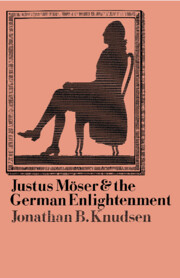Book contents
- Frontmatter
- Contents
- Preface
- Acknowledgments
- Abbreviations
- 1 Justus Möser in the German Enlightenment
- 2 Möser's social universe: urban notability and Enlightenment intelligentsia
- 3 Möser's political universe: secular politics in a confessional state
- 4 Moser's historical universe: regional history and cosmopolitan history
- 5 The party of incremental movement: social and economic reform in Möser's Osnabrück
- 6 Möser's social theory: local patriotism and the defense of the estates
- 7 The dialectic of Enlightenment: the debate over theory and practice
- Bibliography
- Index
5 - The party of incremental movement: social and economic reform in Möser's Osnabrück
Published online by Cambridge University Press: 17 September 2009
- Frontmatter
- Contents
- Preface
- Acknowledgments
- Abbreviations
- 1 Justus Möser in the German Enlightenment
- 2 Möser's social universe: urban notability and Enlightenment intelligentsia
- 3 Möser's political universe: secular politics in a confessional state
- 4 Moser's historical universe: regional history and cosmopolitan history
- 5 The party of incremental movement: social and economic reform in Möser's Osnabrück
- 6 Möser's social theory: local patriotism and the defense of the estates
- 7 The dialectic of Enlightenment: the debate over theory and practice
- Bibliography
- Index
Summary
Justus Möser entered the regency at a moment when war had brought Osnabrück's economy near collapse. Forced requisitions by the occupying armies had sorely depleted the population of draught and domestic animals. The production of flax and the number of grazing sheep had fallen dramatically. The cottage linen and woolens industry was severely depressed by the lack of raw materials – bleaching agents, wool, flax – and of capital and entrepreneurial skills. Rural indebtedness had increased sharply, since warfare and occupation had made it impossible for most of the rural population to pay rents, taxes, and personal duties. Finally, the administration of the bishopric and the Estates of the Osnabrück Diet were also deeply in debt from forced loans, actually ransoms, paid to each of the occupying armies.
Collapse was the incentive to reform, and Möser played a central part in the reform effort. His preeminence derived from his superior intellectual gifts, which placed him above the other figures within the administration; from the power exercised through his many offices; and from the special constitutional situation of the regency, during which he acted as the pivotal mediator between the Estates and the Hanoverian government. As we have already noted, he served as syndic and secretary to the Ritterschaft, arranging its agenda and preparing its policy recommendations. As chief administrator and consultant to the London chancellery, he was able to force compromises on the two resident privy councillors, since he cast the deciding vote in deadlocked situations. In addition, he formulated the memoranda and legislative drafts that were sent to the German chancellery in London to be transformed into law, and often these drafts were copied verbatim into the final decrees.
- Type
- Chapter
- Information
- Justus Möser and the German Enlightenment , pp. 112 - 144Publisher: Cambridge University PressPrint publication year: 1986



